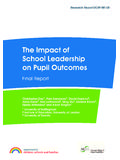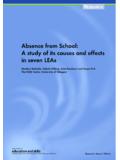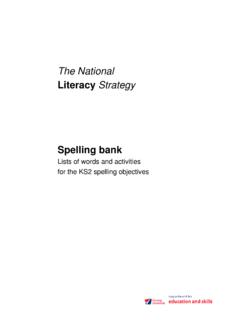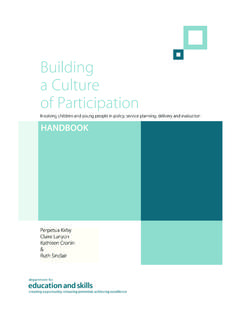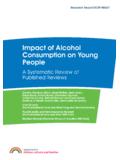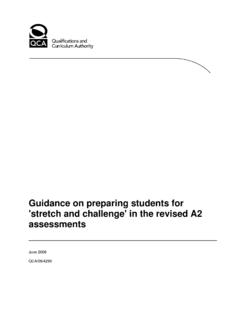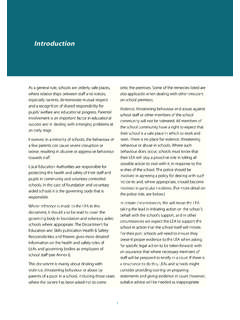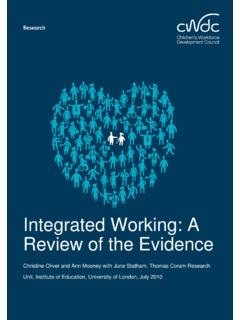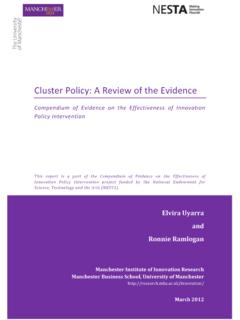Transcription of Clustering together to advance school improvement - full ...
1 Inspiring leaders to improve children's lives Schools and academies Research Associate Full report Alison Lock Headteacher, St Lawrence Church of England Primary school , Lechlade Resource Clustering together to advance school improvement : working together in peer support with an external colleague Spring 2011. Contents Abstract ..3. Introduction ..4. Literature review ..5. Methodology ..8. Findings ..9. Conclusions ..18. References ..20. Acknowledgements ..21. Appendix A ..22. Disclaimer In publishing Research Associate reports, the National College is offering a voice to practitioner leaders to communicate with their colleagues. Individual reports reflect personal views based on evidence-based research and as such are not statements of the National College's policy.
2 2 National College for Leadership of Schools and Children's Services Abstract This research study explored how a group of rural primary schools, working together with the same school improvement partner (SIP), could positively affect the leadership of their schools through group strategic planning and the more efficient use of headteacher time and expertise. By using semi-structured interviews with headteachers and informal discussions with governors, the research investigated whether this method of collaborative working, with a single external professional facilitator, could enhance the leadership of the participating schools. The study concluded that the formation of such a collaborative group could have a positive impact on the leadership of the schools, the wellbeing of the headteachers themselves and the expertise of their governing bodies, when it was led by an external professional who had gained the respect and trust of all members of the group.
3 Although the research specifically explored the role of a SIP held in common, its findings are transferable to any group of school leaders working together with a single external partner such as a national or local leader of education (NLE. or LLE). 3 National College for Leadership of Schools and Children's Services Introduction This research explored the benefits of cluster-based working involving school improvement partners (SIPs). It looked at how a group of rural primary schools have found that working together with the same SIP can positively affect the leadership of all the schools in the cluster. SIPs have worked alongside the leadership of schools with the aim of improving individual pupils' progress and attainment through the leadership of learning and teaching.
4 This study looked primarily at the role of the SIP within a rural primary phase cluster and how schools working together collaboratively could affect and enhance the leadership of the schools by offering effective professional development and mutual pastoral support. The 8 rural primary schools studied varied in size from 35 to 300 pupils, and were situated in either small villages or country towns within the same county and local authority. The schools were all at different stages of the Ofsted cycle and had expressed different needs. While the headteachers had worked together previously in less structured situations, they had not formally collaborated on leadership issues.
5 The collaborative group was led primarily by the SIP and one headteacher who felt strongly that sharing expertise and skills would positively impact on the leadership of all the schools in the cluster. Schools are becoming more autonomous as the role of local authorities is changing. This has been confirmed by the white paper, The Importance of Teaching (DfE 2010), which defines that the primary responsibility for school improvement should lie with the schools, and be supported by highly effective professional development. This may require a change in headteacher leadership style and access to support. The aim of this research was to explore whether cluster peer support facilitated by the collaborative use of a trained external colleague could have a tangible effect on both leadership style and headteacher support, and hence have an impact on school improvement .
6 The research posed the following questions: How can working collaboratively offer support and training to headteachers, and what impact does that have on their schools? How can a supportive group, working together , improve the pastoral wellbeing of headteachers? How can supported collaborative partnership enable headteachers to think strategically beyond external agendas? How can collaborative partnership support governors in their understanding of school data, through the identification of key points and the sharing of expertise? In exploring these questions through semi-structured interviews with a small sample of school leaders, this research offers applicable findings and strategies to school leadership teams in wider contexts, to promote reflection on systems and partnerships and how they might best be utilised to make best use of the time and expertise offered by other external colleagues.
7 It is important to recognise that although from April 2011 SIPs will no longer have a formally defined role in performance management, the generic findings of this research may still be of value as they may be transferable to other groups working with national or local leaders of education (NLEs or LLEs) and other externally provided support. 4 National College for Leadership of Schools and Children's Services Literature review Combating isolation in schools in rural areas through cluster support This research project studied a group of primary schools in rural locations. The schools themselves varied in size from 35 pupils on roll to 300, based in small villages and towns where they were usually the only school in the immediate area.
8 This brings issues that are often different from those faced by schools in urban areas, as isolation can be a negative factor in whole- school improvement and can also impact on headteacher wellbeing. As far back as 1987, Bell and Sigsworth (1987: 119) studied this phenomenon and how it affected good professional practice, arguing for organisational settings that encouraged co-operative and critical dialogue between leaders. Clustering can continue to provide such a positive organisational structure for collaborative working across small rural schools: school -focused development in rural areas necessarily involves the federating or Clustering of several schools to achieve an adequately sized teacher group as the basis of developmental action.
9 That necessary bringing together of several small schools automatically makes school -focused development in rural areas distinctively different from that which a large urban school might generate.'. Bell & Sigsworth 1987: 237. Without such peer support, the imagined or real isolation felt by the rural primary headteacher may eventually undermine their passion for the job and impact negatively on the success of the school . However, a cluster of schools brought together and sharing similar values can encourage and support individual leaders by providing a firm foundation for collaborative growth. The support of a shared external facilitator such as a SIP can enable the articulation and mutual reinforcement of that value system and combat perceived isolation.
10 The role of the SIP as an external partner The concept of the SIP was to make available to school leaders a single conversation' about school improvement with an accredited professional partner (DfES 2005: 6). The role was subsequently expanded to include the brokerage of bespoke professional support for school improvement , based on the deep understanding by the SIP of the individual school , its challenges and the support necessary to advance its improvement (DCSF 2009: 10). From the outset, however, it was recognised that such support should not simply be individualised but also collaborative, and that the pooling of resources and expertise, and the sharing of good practice to deal with common issues, would be of benefit (DfES 2005: 29).
